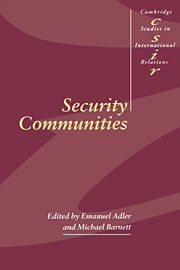Book contents
- Frontmatter
- Contents
- Notes on contributors
- Acknowledgements
- Part I Introduction and theoretical overview
- Part II Studies in security communities
- Part III Conclusions
- 12 International communities, secure or otherwise
- 13 Studying security communities in theory, comparison, and history
- Index
- CAMBRIDGE STUDIES IN INTERNATIONAL RELATIONS
12 - International communities, secure or otherwise
Published online by Cambridge University Press: 30 October 2009
- Frontmatter
- Contents
- Notes on contributors
- Acknowledgements
- Part I Introduction and theoretical overview
- Part II Studies in security communities
- Part III Conclusions
- 12 International communities, secure or otherwise
- 13 Studying security communities in theory, comparison, and history
- Index
- CAMBRIDGE STUDIES IN INTERNATIONAL RELATIONS
Summary
Nineteenth-century analysts of large-scale social change enshrined the word “community” as a votive object. On the left, critics of capitalist expansion dreamed of revolution, demanding an end to alienation and exploitation in the name of socialist, anarchist, or otherwise Utopian communities. On the right, enemies of popular movements, nurturing vindictive visions of the dangerous classes, longed for the peaceful, hierarchical little communities they supposed their grandparents to have inhabited. In the middle, liberals hoped that rational dialogue would install harmony among classes who arrayed angrily against each other as a result of sweeping economic transformations.
Right, left, and center shared the same causal theory: that rapid social change injures solidarities and commitments, which only heal through slow, painful adaptation, through charismatic renewal, or through forceful imposition of new controls. The same theory postulated fragmentation of once-coherent identities into a bewildering, unsatisfying, and ultimately threatening variety of fragmented selves. Sweeping dichotomies - Status vs. Contract, Mechanistic vs. Organic Solidarity, Gemeinschaft vs. Gesellschaft - summed up the century's history as a loss of community, and as a search for its reconstitution.
A haze of Paradigm Lost still surrounds the word “community” in popular parlance, the social sciences, philosophy, and history. Calling up idealized images of solidarity and coherent identity in compact settlements before the advent of today's complexity, the term almost inevitably evokes a mixture of description, sentiment, and moral principle. Users of the term with respect to international relations are usually hoping to create or restore solidarity among nations.
- Type
- Chapter
- Information
- Security Communities , pp. 397 - 412Publisher: Cambridge University PressPrint publication year: 1998
- 21
- Cited by

